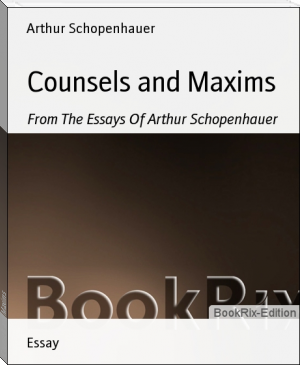Counsels and Maxims - Arthur Schopenhauer (dar e dil novel online reading TXT) 📗

- Author: Arthur Schopenhauer
Book online «Counsels and Maxims - Arthur Schopenhauer (dar e dil novel online reading TXT) 📗». Author Arthur Schopenhauer
one approach who is not in some degree emancipated from the prevailing vulgarity.
From what has been said it is obvious that the love of solitude is not a direct, original impulse in human nature, but rather something secondary and of gradual growth. It is the more distinguishing feature of nobler minds, developed not without some conquest of natural desires, and now and then in actual opposition to the promptings of Mephistopheles - bidding you exchange a morose and soul-destroying solitude for life amongst men, for society; even the worst, he says, will give a sense of human fellowship: -
Hör' auf mit deinem Gram zu spielen,
Der, wie ein Geier, dir am Leben frisst:
Die schlechteste Gesellschaft lässt dich fühlen
Dass du ein Mensch mit Menschen bist.[1]
[Footnote 1: Goethe's Faust , Part I., 1281-5.]
To be alone is the fate of all great minds - a fate deplored at times, but still always chosen as the less grievous of two evils. As the years increase, it always becomes easier to say, Dare to be wise - sapere aude . And after sixty, the inclination to be alone grows into a kind of real, natural instinct; for at that age everything combines in favor of it. The strongest impulse - the love of woman's society - has little or no effect; it is the sexless condition of old age which lays the foundation of a certain self-sufficiency, and that gradually absorbs all desire for others' company. A thousand illusions and follies are overcome; the active years of life are in most cases gone; a man has no more expectations or plans or intentions. The generation to which he belonged has passed away, and a new race has sprung up which looks upon him as essentially outside its sphere of activity. And then the years pass more quickly as we become older, and we want to devote our remaining time to the intellectual rather than to the practical side of life. For, provided that the mind retains its faculties, the amount of knowledge and experience we have acquired, together with the facility we have gained in the use of our powers, makes it then more than ever easy and interesting to us to pursue the study of any subject. A thousand things become clear which were formerly enveloped in obscurity, and results are obtained which give a feeling of difficulties overcome. From long experience of men, we cease to expect much from them; we find that, on the whole, people do not gain by a nearer acquaintance; and that - apart from a few rare and fortunate exceptions - we have come across none but defective specimens of human nature which it is advisable to leave in peace. We are no more subject to the ordinary illusions of life; and as, in individual instances, we soon see what a man is made of, we seldom feel any inclination to come into closer relations with him. Finally, isolation - our own society - has become a habit, as it were a second nature to us, more especially if we have been on friendly terms with it from our youth up. The love of solitude which was formerly indulged only at the expense of our desire for society, has now come to be the simple quality of our natural disposition - the element proper to our life, as water to a fish. This is why anyone who possesses a unique individuality - unlike others and therefore necessarily isolated - feels that, as he becomes older, his position is no longer so burdensome as when he was young.
For, as a matter of fact, this very genuine privilege of old age is one which can be enjoyed only if a man is possessed of a certain amount of intellect; it will be appreciated most of all where there is real mental power; but in some degree by every one. It is only people of very barren and vulgar nature who will be just as sociable in their old age as they were in their youth. But then they become troublesome to a society to which they are no longer suited, and, at most, manage to be tolerated; whereas, they were formerly in great request.
There is another aspect of this inverse proportion between age and sociability - the way in which it conduces to education. The younger that people are, the more in every respect they have to learn; and it is just in youth that Nature provides a system of mutual education, so that mere intercourse with others, at that time of life, carries instruction with it. Human society, from this point of view, resembles a huge academy of learning, on the Bell and Lancaster system, opposed to the system of education by means of books and schools, as something artificial and contrary to the institutions of Nature. It is therefore a very suitable arrangement that, in his young days, a man should be a very diligent student at the place of learning provided by Nature herself.
But there is nothing in life which has not some drawback - nihil est ab omni parte beatum , as Horace says; or, in the words of an Indian proverb, no lotus without a stalk . Seclusion, which has so many advantages, has also its little annoyances and drawbacks, which are small, however, in comparison with those of society; hence anyone who is worth much in himself will get on better without other people than with them. But amongst the disadvantages of seclusion there is one which is not so easy to see as the rest. It is this: when people remain indoors all day, they become physically very sensitive to atmospheric changes, so that every little draught is enough to make them ill; so with our temper; a long course of seclusion makes it so sensitive that the most trivial incidents, words, or even looks, are sufficient to disturb or to vex and offend us - little things which are unnoticed by those who live in the turmoil of life.
When you find human society disagreeable and feel yourself justified in flying to solitude, you can be so constituted as to be unable to bear the depression of it for any length of time, which will probably be the case if you are young. Let me advise you, then, to form the habit of taking some of your solitude with you into society, to learn to be to some extent alone even though you are in company; not to say at once what you think, and, on the other hand, not to attach too precise a meaning to what others say; rather, not to expect much of them, either morally or intellectually, and to strengthen yourself in the feeling of indifference to their opinion, which is the surest way of always practicing a praiseworthy toleration. If you do that, you will not live so much with other people, though you may appear to move amongst them: your relation to them will be of a purely objective character. This precaution will keep you from too close contact with society, and therefore secure you against being contaminated or even outraged by it.[1] Society is in this respect like a fire - the wise man warming himself at a proper distance from it; not coming too close, like the fool, who, on getting scorched, runs away and shivers in solitude, loud in his complaint that the fire burns.
[Footnote 1: This restricted, or, as it were, entrenched kind of sociability has been dramatically illustrated in a play - well worth reading - of Moratin's, entitled El Café o sea la Comedia Nuova (The Cafe or the New Comedy), chiefly by one of the characters, Don Pedro and especially in the second and third scenes of the first act.]
SECTION 10. Envy is natural to man; and still, it is at once a vice and a source of misery.[1] We should treat it as the enemy of our happiness, and stifle it like an evil thought. This is the advice given by Seneca; as he well puts it, we shall be pleased with what we have, if we avoid the self-torture of comparing our own lot with some other and happier one - nostra nos sine comparatione delectent; nunquam erit felix quem torquebit felicior.[2] And again, quum adspexeris quot te antecedent, cogita quot sequantur [3] - if a great many people appear to be better off than yourself, think how many there are in a worse position. It is a fact that if real calamity comes upon us, the most effective consolation - though it springs from the same source as envy - is just the thought of greater misfortunes than ours; and the next best is the society of those who are in the same luck as we - the partners of our sorrows.
[Footnote 1: Envy shows how unhappy people are; and their constant attention to what others do and leave undone, how much they are bored.]
[Footnote 2: De Ira : iii., 30.]
[Footnote 3: Epist. xv.]
So much for the envy which we may feel towards others. As regards the envy which we may excite in them, it should always be remembered that no form of hatred is so implacable as the hatred that comes from envy; and therefore we should always carefully refrain from doing anything to rouse it; nay, as with many another form of vice, it is better altogether to renounce any pleasure there may be in it, because of the serious nature of its consequences.
Aristocracies are of three kinds: (1) of birth and rank; (2) of wealth; and (3) of intellect. The last is really the most distinguished of the three, and its claim to occupy the first position comes to be recognized, if it is only allowed time to work. So eminent a king as Frederick the Great admitted it - les âmes privilegiées rangent à l'égal des souverains , as he said to his chamberlain, when the latter expressed his surprise that Voltaire should have a seat at the table reserved for kings and princes, whilst ministers and generals were relegated to the chamberlain's.
Every one of these aristocracies is surrounded by a host of envious persons. If you belong to one of them, they will be secretly embittered against you; and unless they are restrained by fear, they will always be anxious to let you understand that you are no better than they . It is by their anxiety to let you know this, that they betray how greatly they are conscious that the opposite is the truth.
The line of conduct to be pursued if you are exposed to envy, is to keep the envious persons at a distance, and, as far as possible, avoid all contact with them, so that there may be a wide gulf fixed between you and them; if this cannot be done, to bear their attacks with the greatest composure. In the latter case, the very thing that provokes the attack will also neutralize it. This is what appears to be generally done.
The members of one of these aristocracies usually get on very well with those of another, and there is no call for envy between them, because their several privileges effect an equipoise.
SECTION 11. Give mature and repeated consideration to any plan before you proceed to carry it out; and even after you have thoroughly turned it over in your mind, make some concession to the incompetency of human judgment; for it may always happen that circumstances which cannot be investigated or foreseen, will come in and upset the whole of your calculation. This is
From what has been said it is obvious that the love of solitude is not a direct, original impulse in human nature, but rather something secondary and of gradual growth. It is the more distinguishing feature of nobler minds, developed not without some conquest of natural desires, and now and then in actual opposition to the promptings of Mephistopheles - bidding you exchange a morose and soul-destroying solitude for life amongst men, for society; even the worst, he says, will give a sense of human fellowship: -
Hör' auf mit deinem Gram zu spielen,
Der, wie ein Geier, dir am Leben frisst:
Die schlechteste Gesellschaft lässt dich fühlen
Dass du ein Mensch mit Menschen bist.[1]
[Footnote 1: Goethe's Faust , Part I., 1281-5.]
To be alone is the fate of all great minds - a fate deplored at times, but still always chosen as the less grievous of two evils. As the years increase, it always becomes easier to say, Dare to be wise - sapere aude . And after sixty, the inclination to be alone grows into a kind of real, natural instinct; for at that age everything combines in favor of it. The strongest impulse - the love of woman's society - has little or no effect; it is the sexless condition of old age which lays the foundation of a certain self-sufficiency, and that gradually absorbs all desire for others' company. A thousand illusions and follies are overcome; the active years of life are in most cases gone; a man has no more expectations or plans or intentions. The generation to which he belonged has passed away, and a new race has sprung up which looks upon him as essentially outside its sphere of activity. And then the years pass more quickly as we become older, and we want to devote our remaining time to the intellectual rather than to the practical side of life. For, provided that the mind retains its faculties, the amount of knowledge and experience we have acquired, together with the facility we have gained in the use of our powers, makes it then more than ever easy and interesting to us to pursue the study of any subject. A thousand things become clear which were formerly enveloped in obscurity, and results are obtained which give a feeling of difficulties overcome. From long experience of men, we cease to expect much from them; we find that, on the whole, people do not gain by a nearer acquaintance; and that - apart from a few rare and fortunate exceptions - we have come across none but defective specimens of human nature which it is advisable to leave in peace. We are no more subject to the ordinary illusions of life; and as, in individual instances, we soon see what a man is made of, we seldom feel any inclination to come into closer relations with him. Finally, isolation - our own society - has become a habit, as it were a second nature to us, more especially if we have been on friendly terms with it from our youth up. The love of solitude which was formerly indulged only at the expense of our desire for society, has now come to be the simple quality of our natural disposition - the element proper to our life, as water to a fish. This is why anyone who possesses a unique individuality - unlike others and therefore necessarily isolated - feels that, as he becomes older, his position is no longer so burdensome as when he was young.
For, as a matter of fact, this very genuine privilege of old age is one which can be enjoyed only if a man is possessed of a certain amount of intellect; it will be appreciated most of all where there is real mental power; but in some degree by every one. It is only people of very barren and vulgar nature who will be just as sociable in their old age as they were in their youth. But then they become troublesome to a society to which they are no longer suited, and, at most, manage to be tolerated; whereas, they were formerly in great request.
There is another aspect of this inverse proportion between age and sociability - the way in which it conduces to education. The younger that people are, the more in every respect they have to learn; and it is just in youth that Nature provides a system of mutual education, so that mere intercourse with others, at that time of life, carries instruction with it. Human society, from this point of view, resembles a huge academy of learning, on the Bell and Lancaster system, opposed to the system of education by means of books and schools, as something artificial and contrary to the institutions of Nature. It is therefore a very suitable arrangement that, in his young days, a man should be a very diligent student at the place of learning provided by Nature herself.
But there is nothing in life which has not some drawback - nihil est ab omni parte beatum , as Horace says; or, in the words of an Indian proverb, no lotus without a stalk . Seclusion, which has so many advantages, has also its little annoyances and drawbacks, which are small, however, in comparison with those of society; hence anyone who is worth much in himself will get on better without other people than with them. But amongst the disadvantages of seclusion there is one which is not so easy to see as the rest. It is this: when people remain indoors all day, they become physically very sensitive to atmospheric changes, so that every little draught is enough to make them ill; so with our temper; a long course of seclusion makes it so sensitive that the most trivial incidents, words, or even looks, are sufficient to disturb or to vex and offend us - little things which are unnoticed by those who live in the turmoil of life.
When you find human society disagreeable and feel yourself justified in flying to solitude, you can be so constituted as to be unable to bear the depression of it for any length of time, which will probably be the case if you are young. Let me advise you, then, to form the habit of taking some of your solitude with you into society, to learn to be to some extent alone even though you are in company; not to say at once what you think, and, on the other hand, not to attach too precise a meaning to what others say; rather, not to expect much of them, either morally or intellectually, and to strengthen yourself in the feeling of indifference to their opinion, which is the surest way of always practicing a praiseworthy toleration. If you do that, you will not live so much with other people, though you may appear to move amongst them: your relation to them will be of a purely objective character. This precaution will keep you from too close contact with society, and therefore secure you against being contaminated or even outraged by it.[1] Society is in this respect like a fire - the wise man warming himself at a proper distance from it; not coming too close, like the fool, who, on getting scorched, runs away and shivers in solitude, loud in his complaint that the fire burns.
[Footnote 1: This restricted, or, as it were, entrenched kind of sociability has been dramatically illustrated in a play - well worth reading - of Moratin's, entitled El Café o sea la Comedia Nuova (The Cafe or the New Comedy), chiefly by one of the characters, Don Pedro and especially in the second and third scenes of the first act.]
SECTION 10. Envy is natural to man; and still, it is at once a vice and a source of misery.[1] We should treat it as the enemy of our happiness, and stifle it like an evil thought. This is the advice given by Seneca; as he well puts it, we shall be pleased with what we have, if we avoid the self-torture of comparing our own lot with some other and happier one - nostra nos sine comparatione delectent; nunquam erit felix quem torquebit felicior.[2] And again, quum adspexeris quot te antecedent, cogita quot sequantur [3] - if a great many people appear to be better off than yourself, think how many there are in a worse position. It is a fact that if real calamity comes upon us, the most effective consolation - though it springs from the same source as envy - is just the thought of greater misfortunes than ours; and the next best is the society of those who are in the same luck as we - the partners of our sorrows.
[Footnote 1: Envy shows how unhappy people are; and their constant attention to what others do and leave undone, how much they are bored.]
[Footnote 2: De Ira : iii., 30.]
[Footnote 3: Epist. xv.]
So much for the envy which we may feel towards others. As regards the envy which we may excite in them, it should always be remembered that no form of hatred is so implacable as the hatred that comes from envy; and therefore we should always carefully refrain from doing anything to rouse it; nay, as with many another form of vice, it is better altogether to renounce any pleasure there may be in it, because of the serious nature of its consequences.
Aristocracies are of three kinds: (1) of birth and rank; (2) of wealth; and (3) of intellect. The last is really the most distinguished of the three, and its claim to occupy the first position comes to be recognized, if it is only allowed time to work. So eminent a king as Frederick the Great admitted it - les âmes privilegiées rangent à l'égal des souverains , as he said to his chamberlain, when the latter expressed his surprise that Voltaire should have a seat at the table reserved for kings and princes, whilst ministers and generals were relegated to the chamberlain's.
Every one of these aristocracies is surrounded by a host of envious persons. If you belong to one of them, they will be secretly embittered against you; and unless they are restrained by fear, they will always be anxious to let you understand that you are no better than they . It is by their anxiety to let you know this, that they betray how greatly they are conscious that the opposite is the truth.
The line of conduct to be pursued if you are exposed to envy, is to keep the envious persons at a distance, and, as far as possible, avoid all contact with them, so that there may be a wide gulf fixed between you and them; if this cannot be done, to bear their attacks with the greatest composure. In the latter case, the very thing that provokes the attack will also neutralize it. This is what appears to be generally done.
The members of one of these aristocracies usually get on very well with those of another, and there is no call for envy between them, because their several privileges effect an equipoise.
SECTION 11. Give mature and repeated consideration to any plan before you proceed to carry it out; and even after you have thoroughly turned it over in your mind, make some concession to the incompetency of human judgment; for it may always happen that circumstances which cannot be investigated or foreseen, will come in and upset the whole of your calculation. This is
Free e-book «Counsels and Maxims - Arthur Schopenhauer (dar e dil novel online reading TXT) 📗» - read online now
Similar e-books:





Comments (0)